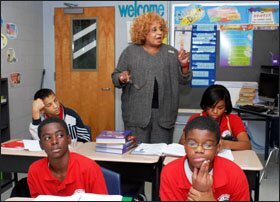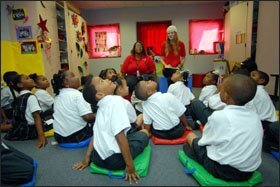Fifty-two sober-faced 6th graders sit shoulder to shoulder in Nikia Dillard’s classroom, silently listening as Doris R. Hicks, the principal of the Dr. Martin Luther King Jr. Charter School for Science and Technology, speaks to them forcefully about their academic responsibilities.
Ms. Dillard and King’s two other 6th grade teachers had told Ms. Hicks that several students had been slacking off. Some had failed to complete a class project on scientists and inventors that was assigned during the first two weeks of school in August.
Ms. Hicks is not pleased. So she calls them together Tuesday morning for a stern pep talk.

A lot is on the line, she tells them. There are only three more days left in the first quarter. Their performance on subject exams and their special projects will weigh heavily on their quarterly grades that come out next week.
She directs tough questions at them: Why haven’t you completed your projects? Are they too hard? What’s your excuse? Most respond with downcast eyes. One boy speaks up to say he had waited until the last minute.
“You’ve been in here since August, and you’ve covered a lot of material,” Ms. Hicks says. “Now is the time for you to show us what you learned, what you’ve mastered. We want As, or maybe Bs. Do not settle for a D. Do not settle for a C.”
Stakes High
August was when King came home to its original campus, which was drowned in Hurricane Katrina’s floodwaters in 2005. Since the school first opened in 1992 in this city’s Lower Ninth Ward, its mostly low-income students have routinely posted solid academic performances that outshone most of their peers in public schools across the city.
After the storm, Ms. Hicks and her faculty chose to convert King to a charter school, convinced it was the only way to save their building on Claiborne Avenue and preserve the academic reputation that they spent a decade building in one of the city’s most disadvantaged neighborhoods.

That some of King’s older students were beginning to fall behind in their schoolwork had set off alarm bells.
“We have to work really hard to make the material relevant and accessible to our kids, and it’s disappointing when they don’t follow through,” says Ms. Dillard, who teaches mathematics to King’s 6th graders. “We try to make them understand how important all of this is, and what’s at stake.”
The same morning, three other charter schools in New Orleans—40 of the independent, publicly funded schools have opened here since Katrina—had learned that their autonomy could be at stake.
Because of low scores on state exams and a failure to submit plans to improve academic achievement, the superintendent of the Orleans Parish public schools announced he was recommending that the three charters be placed on a “high-risk” list that would bring them more monitoring and extra assistance.

The Orleans Parish school board—which ran the city’s public schools until the state stepped in after Katrina to take over all of the failing schools—now oversees a dozen charters and five high-performing, selective-admissions schools that were not swept into the state-run Recovery School District.
King’s charter falls under the oversight of the Recovery School District, rather than the Orleans Parish system. But the scrutiny for all charters, Ms. Hicks predicts, “is probably going to get more and more intense.”
Extra Attention
An hour after her lecture to the 6th graders, Ms. Hicks is at it again, this time with King’s 25 8th graders. Their English teacher, Yvonne Lancelin, worries that many of them are not prepared for their quarterly exam in language arts, which requires them to write a short essay.
Much is riding on how well King’s 8th graders do. In order for them to move on to high school, they must pass Louisiana’s high-stakes exam in March. So Ms. Hicks gives them extra attention. She moves desk to desk to inspect their work.
“Get your notes together, you must be more organized,” she tells one girl. “You all need to form study groups and work together, because this is what you will need to do in high school and in college.”
Ms. Lancelin, who insists that students call her “Mama Lancelin,” explains that her 8th graders require special care. Many still harbor fear and anger about the hurricane, but don’t express it openly like the younger students at King.

The “View From King” dispatches are part of Education Week’s 2007-08 special series focusing on education recovery and reform efforts in New Orleans.
Learn more about the series.
“These children seem so resilient, but you really have to watch them closely,” she says. She learned that lesson after noticing that one girl in her class never ate lunch. Ms. Lancelin approached her recently to ask why.
“She told me she couldn’t stand the thought of standing in line in the cafeteria to wait for food, because that’s what she had to do for weeks and months after the storm while her family lived in a shelter,” Ms. Lancelin says.
Still, the teacher says, the most important things she can offer her students are high expectations and a demand for good work. Seconds before the bell rings to start the lunch period, she issues a final piece of advice to them for their writing exam.
“I am begging you to remember that there are many other ways to start a sentence other than with ‘the’ or ‘she,’ ” she tells them. “I want to see some variety. … It will be very important for your final grade on the test.”





